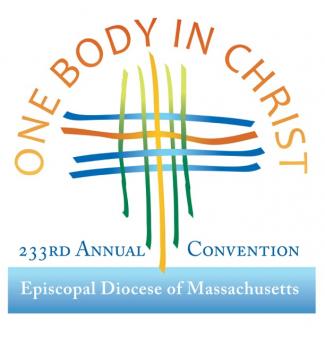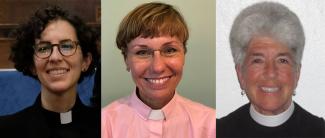This year's annual Diocesan Convention promises celebration in addition to the usual legislative business as it gets set to consider the admission of two new mission congregations and also marks the 30th anniversary of the historic election of the first woman to become a bishop in the Anglican Communion.
The convention takes place Nov. 2-3 at the Cape Cod Resort and Conference Center in Hyannis. A live webcast of Nov. 3 proceedings is planned via www.diomass.org. The event hashtag for those participating via social media is #DioMassCon18.
A highlight for many convention-goers will be a banquet and program on Friday, Nov. 2 honoring the Rt. Rev. Barbara C. Harris, whose election as bishop suffragan in September 1988 in the Diocese of Massachusetts led to her consecration the following year and changed the church.
A full day of convention business follows on Saturday, Nov. 3.
Under the theme "One Body in Christ," the convention program will include the launch of Massachusetts Indaba 2019--a diocesan mission strategy initiative aimed at building relationships among congregations across the diocese through purposeful conversation and encounters.
A variety of social justice concerns will come before the convention, ranging from the church's response to the opioid crisis, immigrant justice and support for gender identity antidiscrimination law in Massachusetts, to church use of fair trade coffee and a commitment to creation care through tree planting.
In addition to resolutions on those topics, the convention will consider the requests of two worshiping communities--Grace Chapel in Brockton and the Anglican Congregation of St. Peter at Christ Church in Waltham--to become mission congregations in union with the diocese. And, the convention will vote on the $8.8-million diocesan budget proposed for 2019, among other business.
Clergy and lay delegates--two from each congregation--convene annually for Diocesan Convention, the diocese's primary governing body.
Find registration, materials and updates at www.diomass.org/diocesan-convention-2018.
Elections
Nominees for election to a clerical position on the Cathedral Chapter are the Rev. Emily Garcia of the Church of the Redeemer in Chestnut Hill, the Rev. Mary Scott Miller of Christ Church in Needham and the Rev. Katharine Black of St. Mark's Church in Dorchester.
(The Rev. Elizabeth Grundy withdrew from nomination for election to the Cathedral Chapter and the Standing Committee as of Oct. 16. The Rev. Elise Feyerherm of St. Paul's Church in Brookline will be elected unopposed to the clerical position open on the Standing Committee.)
Read more about the nominees here.
Budget
The convention will vote on a proposed 2019 budget of $8,790,086, compared to the 2018 budget of $8,665,754 (an additional $150,000 approved by Diocesan Council for staff restructuring expenses ultimately brought the 2018 budget total to $8,815,754).
"This budget reflects our continued work to review and adjust, as necessary, our priorities and spending so we can fully live into the mission strategy as adopted by the 2016 Diocesan Convention," the 2018 diocesan treasurer, Lisa Garcia, and Budget Committee chair, Ted Ts'o, explained in a letter accompanying the proposed 2019 budget.
"A continuing challenge has been funding all of our mission and diocesan aspirations given the reduced assessment income, resulting from the revised assessment formula adopted two years ago," Garcia and Ts'o said in their letter.
The tiered assessment formula adopted in 2017 resulted in a 10 percent aggregate decrease in the assessment revenue when it was implemented for the 2018 budget. The formula was renewed this year by Diocesan Council for 2019.
In 2018, the decrease in assessment revenue was largely absorbed through a new diocesan staffing structure. For 2019, the reduced assessment revenue begins to be felt in the funding available for strategic ministries.
This year members of the Diocesan Council made site visits to all of the strategic ministries that receive funding through the diocesan budget. "These site visits helped us to deepen our understanding and appreciation of the great work done by these ministries," Garcia and Ts'o said in their letter. Additionally, they noted, the Diocesan Council has established a Strategic Ministry Committee charged "with relationally working with these ministries to support them, gathering input from the site visits and other sources, and determining the appropriate funding levels for each of these ministries."
Find the full budget here.
Resolutions
Five resolutions have been proposed for the convention's consideration this year.
One resolution encourages the church to respond to the opioid crisis by partnering "with those who are already doing the work of healing and support to the people affected by this epidemic to learn best practices of how to reach out and provide God’s loving mercy to those who are struggling with addiction and to the family and friends who support them in their work of recovery." The resolution also encourages churches to have the overdose reversal medication Naloxone available and that clergy and other parish leaders be trained to administer it in emergency situations.
Another resolution calls for the use of fair trade coffee at all church events, and encourages support for fair trade goals, which, according to the resolution, include raising income levels of small-scale farmers and farm workers; more equitable distribution of economic gains across the industry; encouraging environmentally sound and sustainable farming methods; promoting ethical working conditions; and increasing consumer awareness of the economic forces affecting farmers and the exploitation of workers.
A resolution advocating gender identity antidiscrimination asks the convention to endorse Massachusetts Ballot Question #3 and encourage a "yes" vote to maintain the Massachusetts public accommodations law, adopted in 2016 to add gender identity to the list of prohibited grounds for discrimination in public places such as hotels, stores, restaurants, theaters, sports facilities and hospitals. The Diocesan Convention first took a position on the issue in 2008 when it adopted a measure calling for local, state and federal laws to prohibit gender identity discrimination and to treat physical violence inflicted on the basis of a victim’s gender identity or expression as a hate crime.
A resolution in support of creation care would commit the diocese to establish a "Paris Grove" at its Barbara C. Harris Camp and Conference Center in Greenfield, N.H., in response to the 2018 General Convention's call that “each of the 85 camp and conference centers in the Episcopal Church establish ‘Paris Groves,’ plantings of trees at the camp and conference centers or other church-owned properties that will serve as visible witnesses to the significance of the Paris Accord and do the practical work of sequestration of carbon from the atmosphere.” The diocesan resolution also encourages the use of an additional Baptismal Covenant question, approved for trial use by the 2015 General Convention: "Will you cherish the wondrous works of God, and protect and restore the beauty and integrity of all creation?"
A resolution "Seeking Immigrant Justice through Accompaniment, Advocacy and Direct Action" affirms Episcopal Church positions opposing immigrant enforcement action against those who have not committed felony crimes and in support of "a pathway to legalization and to full social and economic integration into the United States” for undocumented immigrants with established roots in the U.S. The resolution calls for challenging and resisting agreements by local law enforcement agencies to act as agents of Immigration Customs Enforcement (ICE), and it encourages connections with Episcopal Church entities and "local and national communities and institutions, immigrant rights groups and coalitions" for the purposes of "educating, organizing, advocacy, direct action and other methods as deemed appropriate in each context to ensure the safety and security of our immigrant neighbors."
The immigrant justice resolution also urges accompaniment and support for "our undocumented siblings, during this time of heightened activity against them, serving as a people of welcome, refuge, healing and offering other forms of support for those targeted for deportation due to immigration status or some perceived status of difference," and it highlights diocesan and Episcopal City Mission support and programs available to congregations engaging in immigration ministry.
The full texts of proposed resolutions are available in the Handbook, here.


